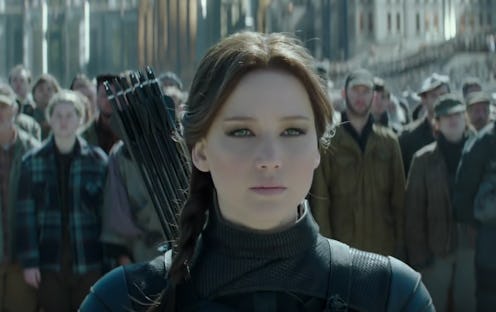
No matter what critics might say, The Hunger Games is not just for teenagers. Yes, the franchise is based on a book series aimed at the Young Adult genre, and, yes, the Jennifer-Lawrence starring movies, too, are marketed towards a teenage audience, but it would be a disservice to the material to call it simple adolescent fodder without any greater meaning. In fact, the dystopian reality presented in Suzanne Collins' series is far from that of your usual teenage-centric films; unlike many of its peers in the genre, The Hunger Games explores real issues, ranging from the nature to celebrity to the plight of child soldiers.
Although the series is often diluted into a simple obsession with the love triangle between heroine Katniss and her two beaus, Gale and Peeta, it would be a mistake to call The Hunger Games a love story — or even a Twilight equivalent. Whatever romances are presented in the franchise are not stories of true love (at least, not for Katniss), and they are secondary to much more pressing matters. Instead of focusing on Katniss' conflicting feelings for her two suitors, the Hunger Games books and films place more emphasis on her struggle to fight against an oppressive political regime in the Capitol, led by the villainous President Snow. Issues of corruption in government, dictatorships and, yes, love, are just a few of the very harsh and very real issues tackled in The Hunger Games series.
1. Poverty
Katniss and Peeta may be an iconic fictional couple, but their romance does not blossom out of attraction. Instead, the duo's bond grows out of the poverty they both face. When they're first placed together, she remembers him as the "boy with the bread" who fed a starving Katniss an old, stale loaf that was meant as food for animals. The pair's relationship is entirely rooted in their extreme poverty, something never forgotten in the Hunger Games series, no matter how fancy their outfits or televised their feelings become.
2. Child Warfare
It's not pleasant to think that a Hollywood blockbuster features a plot where children are forced to kill each other for sport. However, the idea of child soldiers effectively being used by a corrupt leader to enact war is not so far-fetched, but rather something seen in everyday, nonfictional life. The devastating reality of the series' young fighters is a difficult one to tackle, and one placed front and center throughout The Hunger Games.
3. Oppressive Governments
On the surface, the idea of the Hunger Games might seem like a clever plot device, adding drama and action to a teenage story, but it mainly serves to show the extreme power and capabilities of an oppressive government. The corrupt President Snow keeps Panem citizens in a constant state of hunger and poverty; he manipulates them into competing in the Hunger Games by promising a lifetime of riches for the victor, but this, in turn, keep citizens too afraid to revolt.
4. Classism
The Games in Panem are predisposed to benefit those of higher class, as the richer the District, the more training tributes have before they step into the arena. This means that there are children of higher class who are trained from birth to win the Games, while poorer children might be coming in with no fighting background. Of course, that doesn't make the upper class kids any less used than tributes like Katniss, but it exposes a system designed to benefit the rich and leave others in poverty (and in the Games' case, real danger).
5. Surveillance/Reality TV
Everything that occurs in the Hunger Games is recorded and broadcast across Panem. Broadcasting the deaths of innocent teenagers might not seem like the way to cultivate political support, but President Snow uses it to advertise the consequences of any rebellion. The reality television aspect of the Games also forces audiences to question how they consume that sort of media. Is it ethical to watch children slaughter each other on television? Of course not — so why do we tend not to have a problem with watching a couple's marriage dissolve or a couple give birth, all from the comfort of our living rooms?
6. Propaganda
Yes, the entire concept of the Hunger Games is a kind of disturbed form of propaganda for the Capitol, but even after Katniss escapes from President Snow, she is used. In Mockingjay, Katniss is pushed into filming propaganda for the rebellion — a role she doesn't particularly want or enjoy. This manipulation of the optics of an issue or conflict is a huge component of war and revolution, but as The Hunger Games makes clear, just because propaganda might help a good cause doesn't mean that it in of itself is good.
7. The Nature Of Celebrity
The Hunger Games warns against a culture obsessed with fame and the media based around the notion of celebrity. Tributes sent to the Games are treated like royalty, and winners are considered national heroes. The nature of celebrity in Panem is very fickle, deadly, and used to help prop up a dictator. Not exactly a flattering picture, is it?
With The Hunger Games saga coming to an end so soon, it's important to remember that it gave us much more than just a love triangle, for better and for worse.
Images: Lionsgate; Giphy (4); seaquell/tumblr; joshifcr/tumblr; timberlakeswift/tumblr